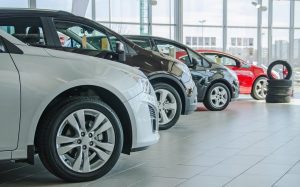 COVID-19 presents several major challenges and setbacks for the automotive industry. It’s predicted that this health crisis could lead to a significant dip in the auto market and it’s nearly impossible to think that each and every one of you hasn’t already felt impacted in some way. If you haven’t started yet, now is the time to look at the factors that pose a threat to your dealership or shop and find creative solutions to come out ahead. Business owners who step up, communicate well, formulate a plan for moving forward, and are willing to adapt will find themselves in a much better position than those who don’t.
COVID-19 presents several major challenges and setbacks for the automotive industry. It’s predicted that this health crisis could lead to a significant dip in the auto market and it’s nearly impossible to think that each and every one of you hasn’t already felt impacted in some way. If you haven’t started yet, now is the time to look at the factors that pose a threat to your dealership or shop and find creative solutions to come out ahead. Business owners who step up, communicate well, formulate a plan for moving forward, and are willing to adapt will find themselves in a much better position than those who don’t.
According to a recent study done by independent research company PwC, the top concerns for business owners in regards to COVID-19 are:
- Overall financial impact
- Potential global recession
- Reduction in staff productivity
- Decrease in consumer confidence
- Supply chain delays and disruptions
It’s completely natural to be concerned about the overall financial impact this will have on your business and how it will affect future operations and resources. Dealerships have been impacted by forces outside of their control such as production lines shutting down and trade restrictions meaning a massive delay in new vehicles arriving on the showroom floor. However, this week, assembly plant workers returned to work with more planning to resume operations on May 18th.
As Americans face an unprecedented amount of unemployment and uncertain financial security for those who have maintained jobs, car sales unsurprisingly plummeted ranging from a 10.4% (Chrysler) decline to over 40% (Hyundai) in the month of March alone. With people home and massively reducing their time on the road, shops have seen a decline in the need for service appointments as well. Some shops have seen a 50% reduction or more in revenue and yet, like dealerships, have managed to stay afloat despite having mounting bills and payroll to take care of. As the economy slowly starts to reopen, business owners are hopeful things will start to move in an upward trend while some experts warn of a ‘double dip’ recession.
Over the last several weeks, companies have had to deal with a reduction in staff productivity, whether that’s due to employees adjusting to working from home or being short-staffed because of employees who have fallen ill. Meeting and regularly communicating with your team can help keep them on track and it’s also helpful to keep as regular a schedule as possible. You may even need to roll up your sleeves and pitch in when needed if you’re down a few team members.
Consumer confidence is definitely a concern for automotive business owners during the COVID-19 crisis. People want companies to take proper health precautions to keep them and their families safe. They want to feel that their money is well spent and they are much more careful with how and when they’re spending. Each day during the pandemic, consumer confidence is measured nationwide by Morning Consult, and results are shown through their Index of Consumer Sentiment (ICS). The higher the number, the higher the confidence. As of May 1st, the national average for consumer confidence was 84.33. Rhode Island was well above that average, with a rating of 109.5, with Massachusetts (108.4) and Connecticut (107.7) not too far behind.
So where does the automotive industry go from here and how do you do your best to make it through the COVID-19 crisis? First, you should make every effort to keep your employees and customers safe and healthy, especially as people prepare to re-enter the workforce over the next several weeks. This should be your absolute top priority because, without them, there is no business to own and operate. Second, have multiple plans in place based on whether or not there will be a spike in cases and stay open and flexible to different scenarios. Third, keep clear and regular communication with your staff and reach out to your customer base to let them know how and what you’re doing to stay safe.
Finally, be patient. Some experts say it could take months to years for the auto industry to bounce back to their financial state before COVID-19 changed the world as we know it. As we start to move forward and reignite our industry, we must do so with cautious optimism and be prepared for setbacks along the way. Cars have not been at the forefront of Americans’ minds as they have sheltered in place but as they begin to re-enter the world, dealerships and shops will hopefully begin to see significant positive changes.
How has your company been impacted by COVID-19 and what steps have you taken to protect yourself, your employees, and your customers? We want to hear from you! Comment below and connect with us on Facebook and LinkedIn to keep the conversation going.